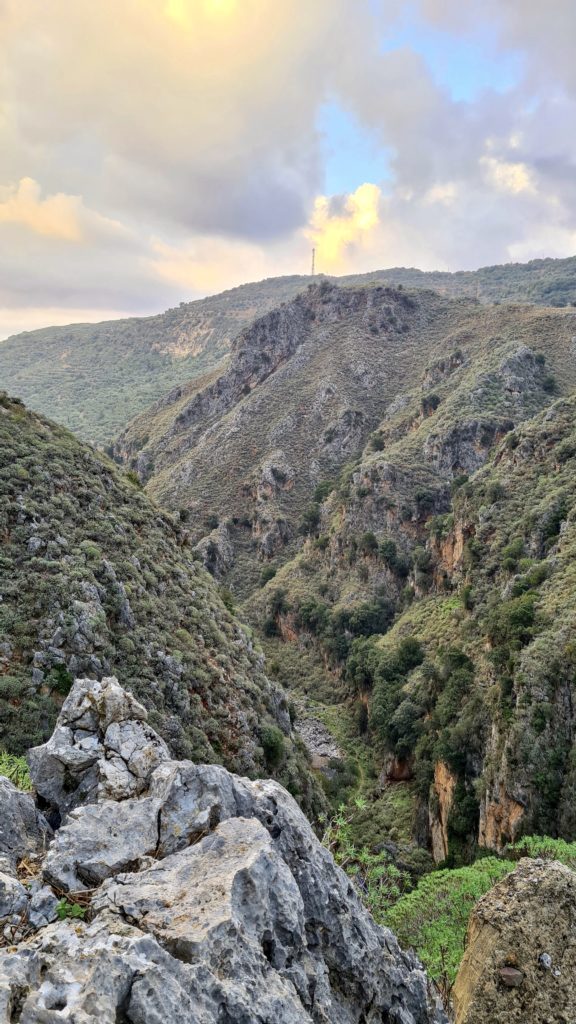The critical role of soil biodiversity for food security
By Ingemar Pongratz

Gorge in Crete Oct 2020 by Ingemar Pongratz
In December 2020, the Food and Agriculture Organization of the United Nations (FAO) released a summary regarding the current state of knowledge regarding soil biodiversity.
The critical importance of soil biodiversity and soil quality is an understudied area that should be a source of considerable concern.
Human and animal wellbeing a critically dependent of rich soil biodiversity. Human and animal food chains are dependent on wide variety of insects, bacteria, fungi and other life forms. Disruption of soil ecosystems invariable lead to disruption of human and animal ecosystems. It is thus surprising that we lack so much knowledge in this area. The critical role of soil biodiversity for food security is a key area to study and in fact represents a high priority area for the European Union through the Horizon Europe research and innovation funding scheme. In fact, one application for the Horizon Europe missions is centred around Soil health.
The Horizon Europe mission are scheduled to start in 2021 and currently under preparation.
Soil health is dependent on an intricate interplay between a wide variety of organisms from different biological phyla, including bacteria, fungi, nematodes, insects etc. All these life forms participate in a complex process that ultimately influence plants, animals and humans. In addition, soil quality is closely connected with processes connected to climate change and environmental change.
There are a number of threats that can impact negatively on soil health. Deforestation, land clearing and urbanization and intensive agricultural practices are well recognized threats to healthy soil biodiversity. The use of fertilizers in agriculture is often accompanied with reduced soil biodiversity and leads to increase number of pathogenic bacteria. Extensive use monoculture in agriculture increase the risks of pests and pathogens both over and below ground. These pathogens can have devastating effects for food security. The use of pesticides to reduce the risks with pests and pathogens negatively affects beneficial bacteria and insects and represents at best a delaying tactic to protect crops.
FAO has identified a number challenges that need to be addressed to soil biodiversity.
- According to FAO there is an urgent need to study and better understand how soil is affected by agriculture, deforestation etc.
- In addition, development and increased use of nature based, soil friendly solutions to increase agricultural yields is a very important action for the future. These solutions should respect both insect and bacterial integrity and inhibit the development of pathogens and pests.
- FAO also highlights the need to better monitor soil health and biodiversity and identify markers that could use to study soil health, in particular using biological indicators and not only chemical and physical markers.
- Use and overuse of chemicals and fertilizers in agriculture should be addressed and development of new, efficient soil friendly solutions to increase agricultural production should be promoted
- The connection between antibiotics, antibiotic resistance and soil health should be addressed to protect both soil, animals and humans
The United Nations (UN) have declared 2021-2030 the decade for environmental restoration. The declaration was presented in 2019 and calls for:
Efforts to prevent, halt and reverse the degradation of ecosystems worldwide that include:
- The possible support of the EU through the Horizon Europe research and innovation funding scheme may become an important channel to achieve this ambitious aim. In addition, soil health remains a key aspect to reach many of the UN Sustainable Development Goals
Ingemar Pongratz is founder of Fenix Scientific AB / Pongratz Consulting. Through Fenix Scientific we support Universities and Enterprises to apply for project funding from European sources including the Horizon Europe scheme. In addition, Ingemar Pongratz has funded Letavis AB. Letavis AB develop and is in the process of introducing new solutions for the agricultural market that increase output and decrease environmental and climate effects of agricultural activities. If you are interested to know more about our products and solutions which are ready for market introduction, please use the online contact form.

Arsta Sweden by Ingemar Pongratz
